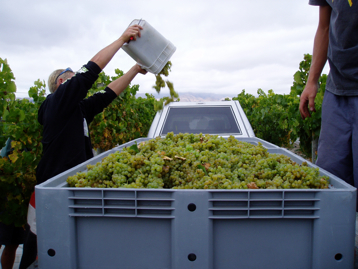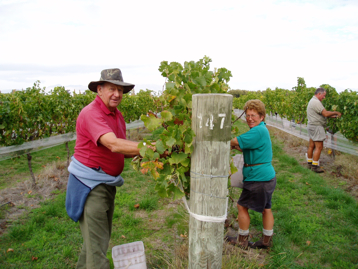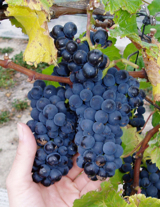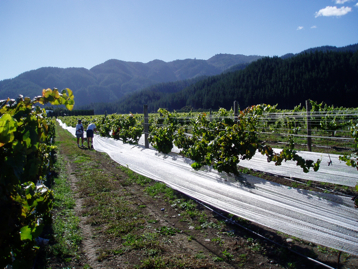 At 7:50 AM, my start time, the air was cool and fresh. The sun was already shining intensely, as it does on cloudless days in Marlborough. This was the moment it hit me…I could make anything happen.
At 7:50 AM, my start time, the air was cool and fresh. The sun was already shining intensely, as it does on cloudless days in Marlborough. This was the moment it hit me…I could make anything happen.
Just six months before, I had the crazy idea of leaving my life in Chicago to work for a winery in New Zealand. I had never worked for a winery before. I had never lived in New Zealand before. I wasn’t qualified for either. But here I stood, in front of Forrest Estate in New Zealand’s largest grape growing region, reporting for my first day of work. I had gone from being a marketing manager to picking grapes in a vineyard. And I couldn’t be happier!
 Don, the vineyard manager, introduced me to my coworkers who ranged in age from 18 to 75, and then he drove us in batches to the vineyard. I sat in the backseat of his car, cramped by the long shotgun that rested beside me. I joked, “Is that in case I get out of line?” Don laughed and explained that the gun was used to scare away menacing birds looking for ripe, juicy grapes to eat. “They could destroy a whole vineyard if we let them,” he said. I could see how that gun would frighten those birds, and I never got used to the sounds of it firing off throughout the day, disrupting the serenity of the vineyard.
Don, the vineyard manager, introduced me to my coworkers who ranged in age from 18 to 75, and then he drove us in batches to the vineyard. I sat in the backseat of his car, cramped by the long shotgun that rested beside me. I joked, “Is that in case I get out of line?” Don laughed and explained that the gun was used to scare away menacing birds looking for ripe, juicy grapes to eat. “They could destroy a whole vineyard if we let them,” he said. I could see how that gun would frighten those birds, and I never got used to the sounds of it firing off throughout the day, disrupting the serenity of the vineyard.
When the gun wasn’t near, which was often, I found the vineyard to be therapeutic. Away from my busy, stressful corporate life on the other side of the world, I found “the other side” of me. I thought I thrived on pressure and deadlines and restless energy. But it turned out I thrived on space, fresh air and quiet. Each day I spent in the vineyard, my head cleared just a bit more. I took in the smells of freshly cut vines and grapes ripened by the warm sun. I indulged in the vibrant flavors of Chardonnay, Pinot Noir and Riesling grapes whenever I felt the inclination. I talked to my coworkers and heard their stories. I listened to music and heard the words. I often listened to nothing but the sounds of clippers and rustling leaves.
The crew was assigned to work one row at a time, each of us picking on opposite sides of a vine. The bushy plants often hid the face of the person working across from me. I would have in-depth conversations with people and feel like I was really getting to know them, but for a long time I could only identify them by their shoes.
 My favorite person was Harold, the 75-year-old retired dairy farmer who came back to work the harvest each year for John and Brigid Forrest. I was impressed by his stamina as well as his perseverance. Harold offered to rub sun block on my back the first day I met him and warned me, “Trouble is my middle name.” Coming from a guy who took naps in his car every afternoon, I wasn’t too concerned. His white hair, kind blue eyes and smile that introduced every story he told put me at ease. He shared fun details of life on the dairy farm, like how his cats used to walk up to him when he was milking the cows and he would spray the milk directly into their mouths.
My favorite person was Harold, the 75-year-old retired dairy farmer who came back to work the harvest each year for John and Brigid Forrest. I was impressed by his stamina as well as his perseverance. Harold offered to rub sun block on my back the first day I met him and warned me, “Trouble is my middle name.” Coming from a guy who took naps in his car every afternoon, I wasn’t too concerned. His white hair, kind blue eyes and smile that introduced every story he told put me at ease. He shared fun details of life on the dairy farm, like how his cats used to walk up to him when he was milking the cows and he would spray the milk directly into their mouths.
That first morning, Don approached me in the vineyard and said in his thick Kiwi/Scottish accent, “If you need a smoko before your morning tea, there are hot drinks in a jug in the boot.” I wasn’t sure if he was offering me cigarettes, drugs or alcohol so I just looked at him, unsure how to respond. He repeated, “Smoko. Morning tea.” One of the others jumped in to translate, and that’s when I learned that “smoko” means “break” as does “morning tea.”
I loved our smokos, which occurred every day at 10:00 and 3:00. We sat together somewhere in the vineyard and had a bite to eat or some coffee or tea – quite civil for a laboring job. It wasn’t just the opportunity for an extra meal that appealed to me about the smoko. These were the times when I felt the greatest sense of community. I laughed as people bantered back and forth like a tennis match. I listened to wild stories about someone getting run over by a tractor or being chased by cows. Their stories and backgrounds were so different than my own as most of them had grown up in small towns or on farms.
We also ate our lunches together – every day, all ages, even the boss. I was part of the “crew” and people looked out for me. If I had to go to the bathroom, someone pointed me down a private row of vines. If I didn’t have enough food, someone offered me part of a sandwich or homemade muffin. They asked me endless questions about life in the US and I told them about freeways and big houses and Hollywood. They took interest in me, regardless of how scruffy I looked each day, and I started to like myself again – the real me. Back in LA and Chicago, I had been caught up in a big salary and a big social life. I lost track of who I was and what was important to me. Now I was getting to know myself, and the world, all over again.
But life wasn’t always carefree in the vineyard. One particular week was much less enjoyable for me. We were working by the river and there were wasps everywhere. Well, the people I worked with called them “wasps” but they were really just larger bees. Evil bees. Instead of stinging once and dying, they could sting several times and survive. “Don’t ever get them caught in your clothes,” I was warned. Got it!
 The wasps liked to suck the juice of the grapes (who didn’t?) so they would burrow their little heads in a bunch of grapes and leave the stinger out. I inspected each bunch carefully before grabbing to pick, and I’m sure my productivity dropped by half that week. Harold, who was much braver and less cautious than I, got stung a few times. We offered him an antihistamine when his hand swelled up, which he quickly turned down, confessing later that he thought we offered him a “hysterectomy.” Well, that would have been tricky!
The wasps liked to suck the juice of the grapes (who didn’t?) so they would burrow their little heads in a bunch of grapes and leave the stinger out. I inspected each bunch carefully before grabbing to pick, and I’m sure my productivity dropped by half that week. Harold, who was much braver and less cautious than I, got stung a few times. We offered him an antihistamine when his hand swelled up, which he quickly turned down, confessing later that he thought we offered him a “hysterectomy.” Well, that would have been tricky!
After spending six weeks in the vineyard, I got a real appreciation for the hard work it takes to make a quality wine. And I saw how much can go wrong. Of all the variables affecting the final outcome, so many are found in the vineyard: weather, soils, farming techniques, pest vulnerability, how the grapes are picked, when the grapes are picked. It seems like a miracle, or an accident, that great wines are ever produced.
Marlborough, as with most grape growing areas in New Zealand, is blessed with very few weather challenges. It has almost perfect conditions for grape growing. This is because it is on the east side of the country, and the mountains keep all the bad weather on the west side. Rain can cause problems like mold or diluting the flavor of the grapes, but Marlborough stays dry and sunny in the fall. The sunshine allows the grapes to ripen evenly and stay on the vines until they develop their full range of flavors. And the cool evenings help them retain those flavors and acidity. The area can have problems with frost though, and I remember my toes freezing on the cold wet ground in the mornings toward the end of harvest.
 By the time harvest ended my body was tired and I knew it was time to go home. There was so much I was going to miss: Riesling grapes glowing opalescent in the sunlight and Pinot Noir wearing the rich shade of blueberries; finding excuses to eat the grapes – I’m hungry, I’m thirsty, I’m tired, I’m learning. I would miss how the vineyard looked different each day depending on the shapes and positions of the clouds, highlighting one section and shadowing another. I would miss the friends I made, especially Harold, and wondered if I would ever see any of them again. I might even miss the distant sounds of gunshots echoing in the fields. But I knew that more than anything else I would miss the smoko.
By the time harvest ended my body was tired and I knew it was time to go home. There was so much I was going to miss: Riesling grapes glowing opalescent in the sunlight and Pinot Noir wearing the rich shade of blueberries; finding excuses to eat the grapes – I’m hungry, I’m thirsty, I’m tired, I’m learning. I would miss how the vineyard looked different each day depending on the shapes and positions of the clouds, highlighting one section and shadowing another. I would miss the friends I made, especially Harold, and wondered if I would ever see any of them again. I might even miss the distant sounds of gunshots echoing in the fields. But I knew that more than anything else I would miss the smoko.
